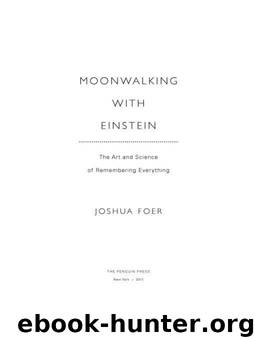Moonwalking with Einstein: The Art and Science of Remembering Everything by Foer Joshua

Author:Foer, Joshua [Foer, Joshua]
Language: eng
Format: mobi
Publisher: The Penguin Press
Published: 2011-03-02T16:00:00+00:00
Twain lived in an age when the technologies for storing and retrieving external memories—paper, books, the recently invented photograph and phonograph—were still primitive compared to what we have today. He could not have foreseen how the proliferation of digital information at the beginning of the twenty-first century would hasten the pace at which our culture has become capable of externalizing its memories. With our blogs and tweets, digital cameras, and unlimited-gigabyte e-mail archives, participation in the online culture now means creating a trail of always present, ever searchable, unforgetting external memories that only grows as one ages. As more and more of our lives move online, more and more is being captured and preserved in ways that are dramatically changing the relationship between our internal and external memories. We are moving toward a future, it seems, in which we will have allencompassing external memories that record huge swaths of our daily activity.
I was convinced of this by a seventy-three-year-old computer scientist at Microsoft named Gordon Bell. Bell sees himself as the vanguard of a new movement that takes the externalization of memory to its logical extreme: a final escape from the biology of remembering.
“Each day that passes I forget more and remember less,” writes Bell in his book Total Recall: How the E-Memory Revolution Will Change Everything. “What if you could overcome this fate? What if you never had to forget anything, but had complete control over what you remembered—and when?”
For the last decade, Bell has kept a digital “surrogate memory” to supplement the one in his brain. It ensures that a record is kept of anything and everything that might be forgotten. A miniature digital camera, called a SenseCam, dangles around his neck and records every sight that passes before his eyes. A digital recorder captures every sound he hears. Every phone call placed through his landline gets taped and every piece of paper Bell reads is immediately scanned into his computer. Bell, who is completely bald, often smiling, and wears rectangular glasses and a black turtleneck, calls this process of obsessive archiving “lifelogging.”
All this obsessive recording may seem strange, but thanks to the plummeting price of digital storage, the increasing ubiquity of digital sensors, and better artificial intelligence to sort through the mess of data we’re constantly collecting, it’s becoming easier and easier to capture and remember ever more information from the world around us. We may never walk around with cameras dangling from our necks, but Bell’s vision of a future in which computers remember everything that happens to us is not nearly as absurd as it might at first sound.
Bell made his name and fortune as an early computing pioneer at the Digital Equipment Corporation in the 1960s and ’70s. (He’s been called the “Frank Lloyd Wright of computers.”) He’s an engineer by nature, which means he sees problems and tries to build solutions. With the SenseCam, he is trying to fix an elemental human problem: that we forget our lives almost as fast as we live them.
Download
This site does not store any files on its server. We only index and link to content provided by other sites. Please contact the content providers to delete copyright contents if any and email us, we'll remove relevant links or contents immediately.
A Mind For Numbers: How to Excel at Math and Science (Even If You Flunked Algebra) by Barbara Oakley(3294)
Limitless by Jim Kwik(3165)
Fluent Forever: How to Learn Any Language Fast and Never Forget It by Gabriel Wyner(3077)
The Marketing Plan Handbook: Develop Big-Picture Marketing Plans for Pennies on the Dollar by Robert W. Bly(3045)
Remember It! by Nelson Dellis(2762)
The Mind Map Book by Tony Buzan(2570)
Memory Rescue by Daniel G. Amen(2418)
The Memory Code by Lynne Kelly(2395)
Super Reading Secrets by Howard Stephen Berg(2041)
Boost Your Brain Power in 60 Seconds by Michelle Schoffro Cook(1984)
Memory Rescue: Supercharge Your Brain, Reverse Memory Loss, and Remember What Matters Most by Amen Dr. Daniel G(1974)
Brain Training: How To Learn and Remember Everything (Neuro Linguistic Programming, Remember Everything, Increase memory, How To Remember Book 1) by Lynch George(1868)
You Can Have an Amazing Memory by Dominic O'Brien(1794)
How We Learn: The Surprising Truth About When, Where, and Why It Happens by Carey Benedict(1783)
The Mechanism of Mind: Understand how your mind works to maximise memory and creative potential by Edward de Bono(1759)
The Old Farmer's Almanac 2020 by Old Farmer’s Almanac(1718)
The Brain Boost Diet Plan by Christine Bailey(1656)
How to Develop a Perfect Memory by Dominic O'Brien(1607)
Master Your Memory by Ron Fry(1540)
